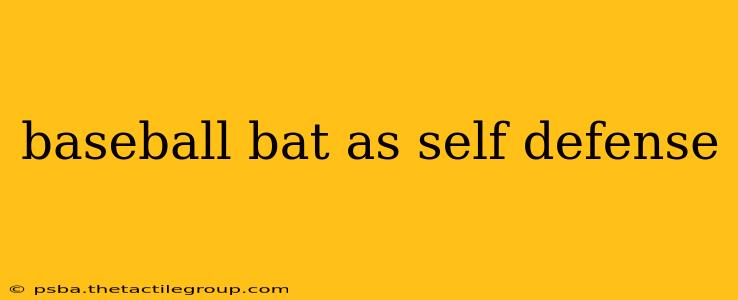Using a baseball bat for self-defense is a complex issue, fraught with legal and practical considerations. While it might seem like a powerful deterrent, the reality is far more nuanced. This article explores the potential benefits and significant drawbacks of employing a baseball bat in self-defense situations, aiming to provide a balanced and informed perspective.
The Allure of the Baseball Bat
The appeal of a baseball bat in self-defense is understandable. It's readily available, relatively inexpensive, and undeniably imposing. Its solid construction suggests a potent weapon capable of delivering significant force. This perceived power can act as a deterrent, potentially preventing an attack before it escalates. The size and weight also offer a degree of reach and leverage, allowing for defense at a distance.
Potential Advantages (with caveats):
- Deterrent: The mere sight of a baseball bat can be enough to dissuade an attacker.
- Reach and Leverage: Its length provides an advantage over hand-to-hand combat, allowing for strikes from a safer distance.
- Force Multiplier: A well-placed swing can inflict considerable damage, potentially incapacitating an attacker.
The High Stakes of Self-Defense with a Bat
However, the advantages are significantly overshadowed by the potential legal and physical repercussions. Using a baseball bat for self-defense carries immense risk.
Legal Ramifications:
- Excessive Force: The use of a baseball bat is almost always viewed as excessive force, even in self-defense situations. The potential for serious injury or death dramatically increases the likelihood of facing criminal charges. The courts will scrutinize the proportionality of your response to the threat. Were you truly in imminent danger, or did you escalate the situation?
- "Stand Your Ground" Laws: While "Stand Your Ground" laws exist in some jurisdictions, they generally don't apply to situations where a weapon is used unless absolutely necessary to prevent serious injury or death. The use of a baseball bat complicates this considerably.
- Civil Liability: Even if you're not criminally charged, you could face substantial civil lawsuits from the injured party.
Physical Risks:
- Injury to the Defender: Attempting to use a baseball bat effectively requires skill and training. A clumsy swing could easily result in injury to yourself.
- Unintended Consequences: The power of a baseball bat can lead to unintended and potentially fatal consequences, even if your intention is only to defend yourself. A miss could injure a bystander.
- Escalation: Using a weapon can escalate a situation rapidly, transforming a minor altercation into a life-threatening confrontation.
Safer Alternatives to a Baseball Bat
Several safer and more legally defensible self-defense options exist. Consider:
- Self-Defense Training: Learning effective self-defense techniques provides you with the ability to defend yourself without resorting to weapons. Courses in Krav Maga, Jiu-Jitsu, or other martial arts can equip you with practical skills.
- Pepper Spray: Pepper spray is a non-lethal self-defense tool that can temporarily incapacitate an attacker, allowing you to escape.
- Personal Alarm: A loud personal alarm can attract attention and potentially deter an attacker.
Conclusion: Weighing the Risks
While a baseball bat might seem like a powerful self-defense tool, the legal and physical risks far outweigh the benefits. It's crucial to remember that the use of any weapon in self-defense carries significant consequences. Prioritizing self-defense training and exploring non-lethal options represents a far safer and more responsible approach. Always prioritize de-escalation and escape if possible. This article is for informational purposes only and does not constitute legal advice. Consult with legal professionals for guidance on self-defense laws in your specific jurisdiction.

